By the year 2026, the internet is going to be like walking in a highly densely populated social area. You everyone want to know what you are doing. Businesses monitor what you visit, marketers watch you go through site to site and some may even attempt to steal your data. Due to this, there are many individuals who desire to have increased privacy.
This is evident in the figures. Studies from 2024 and 2026 tell us:
- Approximately one out of three people all over the globe has adopted a VPN (Virtual Private Network) nowadays.
- According to a survey conducted by the world, 85 per cent of adults desire to do something more to secure their privacy on the internet.
- Approximately 48 percent of all shoppers (almost 50 percent) have ceased to use or purchase a service or a company due to their concerns about their privacy.
Individuals are seeking convenient means of keeping safe. The latest and most popular ones are a web browser with a VPN already integrated into it. This marketer will reveal the top 10 Browsers with Built-in VPN you have in 2026, both free and paid. We will make you know what they are doing, which ones are good and which ones you should avoid.
What is a Browsers with Built-in VPN?
This is not incomprehensible, and it is in fact very easy.
- The application to access the internet is called a browser. You are using one right now. The usual ones are Google Chrome, Safari and Firefox.
- VPN (Virtual private Network) is a solution that keeps your privacy safe. It does two things, it blocks your real location (your IP address), and it also encrypts (scrambles) your traffic on the internet such that no one can read it anymore.
- A browser with an inbuilt VPN is, therefore, simply a browser that has the VPN feature. There is no need to install a different app or extension. All you need to do is to flick a switch in the browser settings and your browsing is more private.
How We Evaluated the Browsers
To create such a list, we viewed each of these browsers in the manner a common individual would. We were seeking the most appropriate, easiest, and secure ones. On these important points we judged them:
- True Privacy: Browser privacy, is it real? We have looked and asked whether it has logs (a record of what you do). An excellent VPN browser must have no logs. A tracking device is not private, in case it captures your information.
- Ease of Use: How easy is it to switch-on and off the VPN? It must be no more than one or two clicks. We did not confuse the browsers.
- Speed: Does it slow down your internet when using the VPN? Slow down is okay but it must not cause videos to buffer or websites to take ages to open.
- Cost (Free vs. Paid): Does the VPN really have no cost? If it is free, what is the catch? (The catch, in most cases, is that they display advertisements or it is a proxy, not a VPN). Is it worth the money should it be paid?
- Security: Does the browser block advertisements and trackers? Additional security measures are a plus.
The 10 Best Browsers with Built-in VPN (2026 Edition)
The following is the review of each of the browsers.
1. Brave Browser
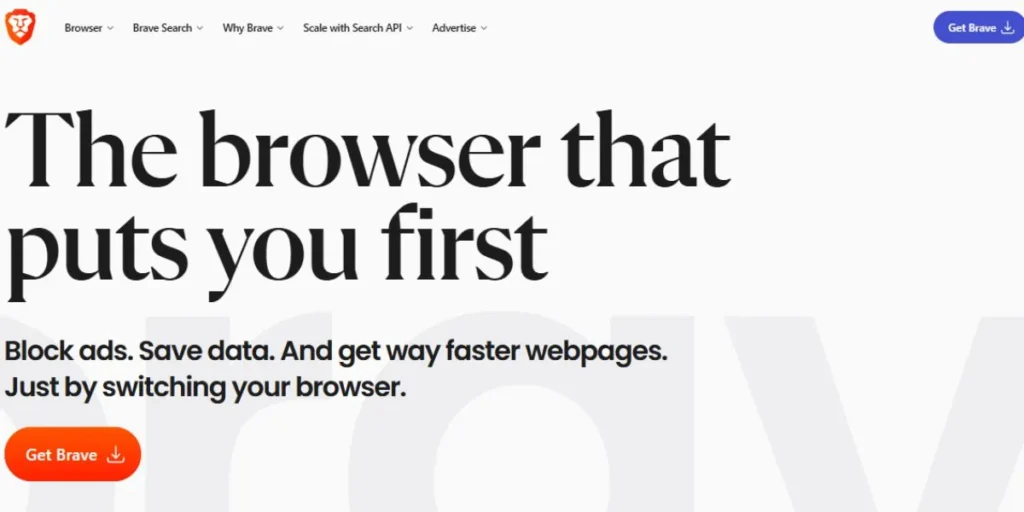
Brave is a privacy-focused browser. It blocks nearly all ads and stalking trackers that spy on you on the internet by default. This renders it extremely speedy and secure. Among the browsers with built-in VPN, Brave had been without a VPN long enough. It now has a Brave Firewall + VPN feature. This is a system-wide, as opposed to browser-only, VPN like Opera.
When you switch it on, not only the browser is guarded, but the whole device. This is the most appropriate kind of protection. Nonetheless, this is a paid subscription. This high-level security is charged on a monthly basis.
Strengths:
- It is a genuine VPN, which safeguards your entire computer or phone.
- The ad and tracker blocking is the finest in the browser itself.
- The company has good no-logs policy, i.e., they do not monitor you.
Limitations:
- The free version is not the best one, the real VPN. You must pay for it.
- Brave Rewards (crypto) is a confusing system to the new users.
Best For:
- Privacy conscious people, who can afford to pay several dollars every month on a high-speed browser and a genuine VPN in a single bundle.
2. Aloha Browser
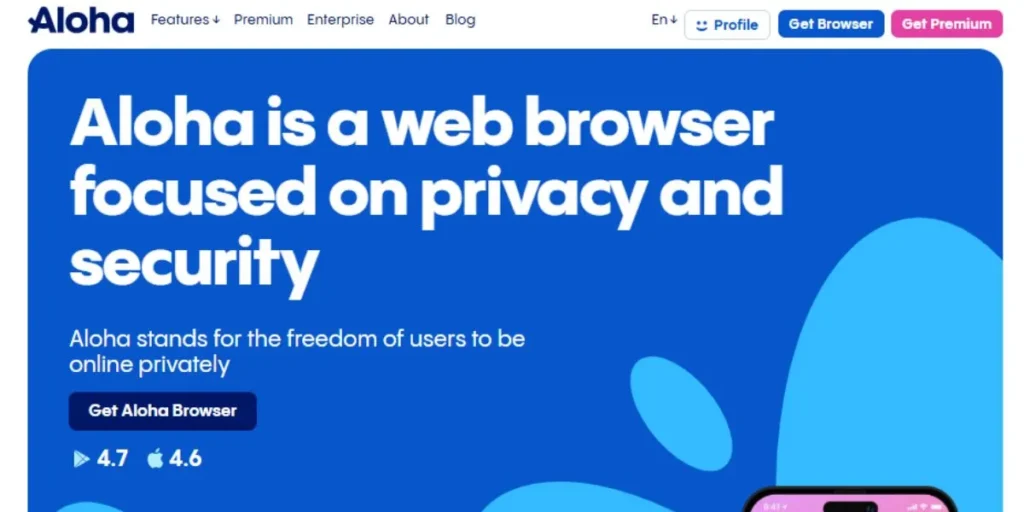
Aloha is a mobile-first browser, which is, in other words, a phone (iPhone and Android) browser. It has gained so much popularity due to the ease it gives to privacy. Among the browsers with built-in VPN, Aloha stands out for its big button on the main screen that enables its inbuilt VPN. The free version is quite effective, providing an authentic VPN connection with no data restrictions.
The hitch is that the free version is ad-supported (in the browser and not on websites) and the locations of the servers are restricted. The paid Premium version allows you to remove the ads, enjoy much faster speeds, and select from a greater number of countries.
Strengths:
- It is extremely user-friendly, particularly on a smartphone.
- Free version Provides a genuine VPN with no data limit.
- You are able to secure privacy tabs using a passcode or fingerprint.
Limitations:
- Free version is slower than the paid version and contains certain advertisements.
- It is mainly for mobile. Although it has a PC version, that is not so popular.
Best For:
- Mobile users. This is likely the most convenient and user-friendly all-in-one phone private browser.
3. Opera Browser
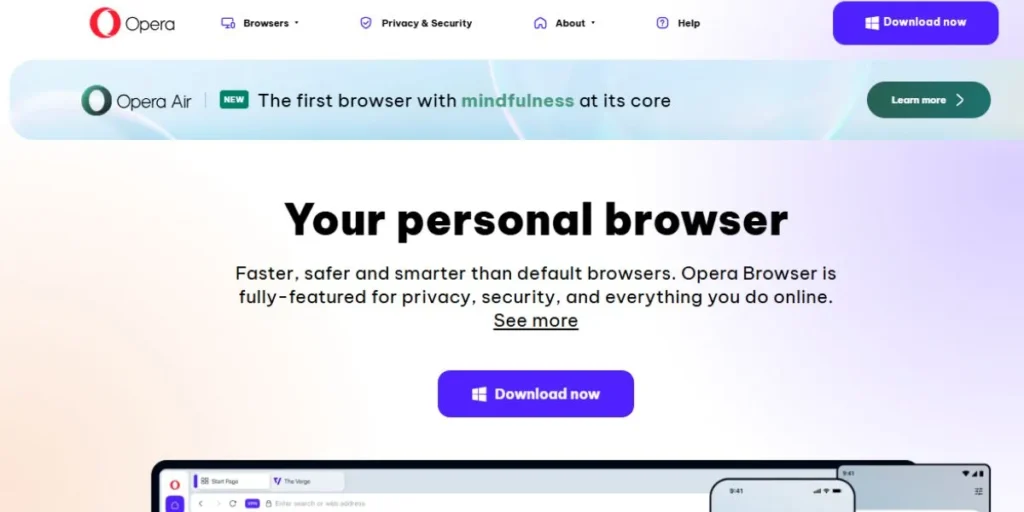
One of the most popular and the oldest browsers with built-in VPN is Opera. Its VPN can be enabled with just one click in the settings, making it highly popular among users who simply need to access sites blocked by their school or country. The application is integrated as the “VPN,” placed next to the address bar, and is very simple to use.
Opera also includes a good ad blocker and a pop-out video player. Unlimited data on Opera’s free VPN is hard to find, as the majority of free services are restricted in the quantity of use.
Strengths:
- – 100 percent free and unlimited data.
- – Very easy to find and turn on.
- – It has a nice ad blocker and other good features.
Limitations:
- – It is a proxy, not a true VPN. It will only secure what you are doing within Opera browser.
- – Privacy scholars have alerted that Opera gathers part of your data to display advertisements. You are being charged with your data on the free service.
Best For:
- Amateurs that wish to view a geo-locked video or bypass a basic site block. It is not for serious privacy.
4. Tor Browser
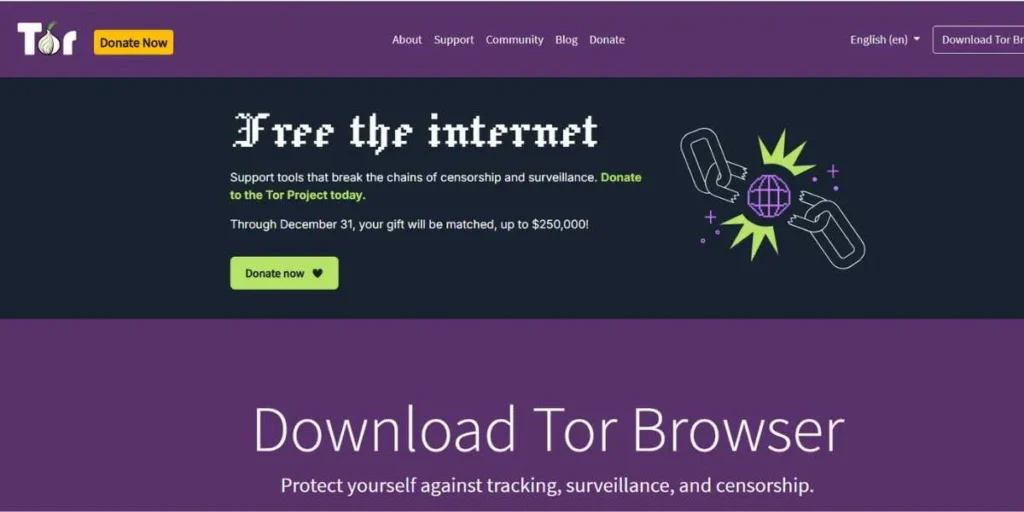
Tor browser is the monarch of privacy. It belongs to another category as compared to all others. It is not a VPN. It is a volunteer global network that is free. With the Tor Browser, your online traffic is encircled in numerous layers of security (it is an onion hence its onion logo).
Your traffic is then hopped between a number of computers (nodes) volunteered by people across the world. It is almost impossible that one knows who you are or where you are. It is the most unidentified method of using the internet.
Strengths:
- The best possible anonymity. Journalists, activists, and individuals who have to conceal themselves against the governments have faith in it.
- It is totally free and non-profit.
- It prevents any trackers, scripts, and anything that may identify you.
Limitations:
- It is very, very slow. Due to your traffic being bounced around the world, videos will not be loaded and websites can be slow.
- (There are some websites (such as banks) that will block you as they are aware that you are using Tor.
Best For:
- People require serious anonymity, not privacy. It is not to stream or make shopping.
5. Avast Secure Browser
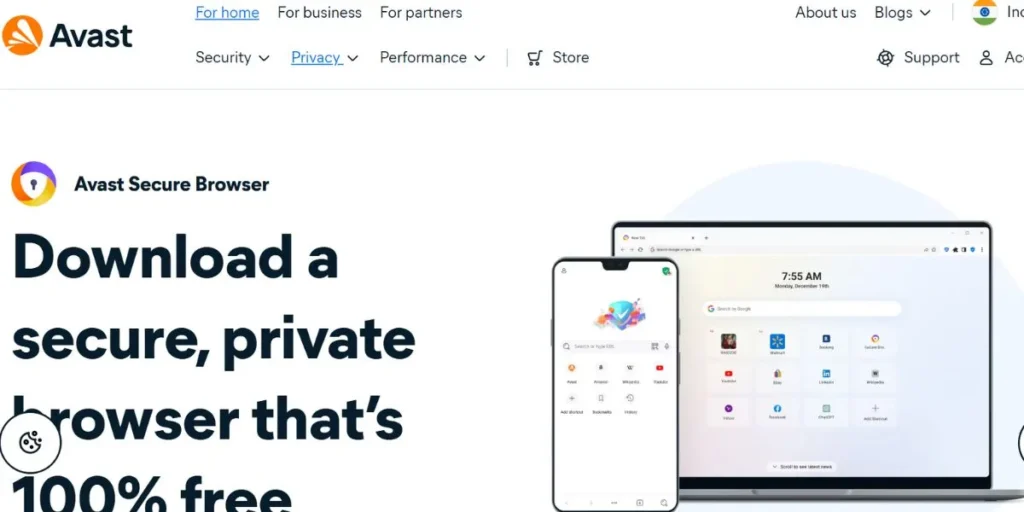
It is a browser produced by Avast, the renowned antivirus maker. Among the browsers with built-in VPN, this one is all about security. It has a complete Security and Privacy Center where everything can be controlled. It includes an inbuilt ad blocker, anti-phishing (defends against scam sites), and anti-tracking. It also features a Bank Mode, which forms a super-safe environment for online banking.
The browser is linked with Avast’s SecureLine VPN, offering a true VPN experience. The free version is limited, and to get optimal speeds and the ability to select your location, you will need a full subscription to Avast SecureLine VPN.
Strengths:
- superior security, such as Bank Mode.
- Implements an actual VPN, not a proxy.
- Produced by a reputed security firm.
Limitations:
- The most desirable VPN characteristics are not free. The free version is a “teaser.”
- The browser is somewhat cumbersome and it attempts to make you purchase other Avast products.
- Previous problems with user data collection and sale have existed with the parent company.
Best For:
- Individuals who already have and have confidence in Avast antivirus and need a browser compatible with Avast.
6. Epic Privacy Browser
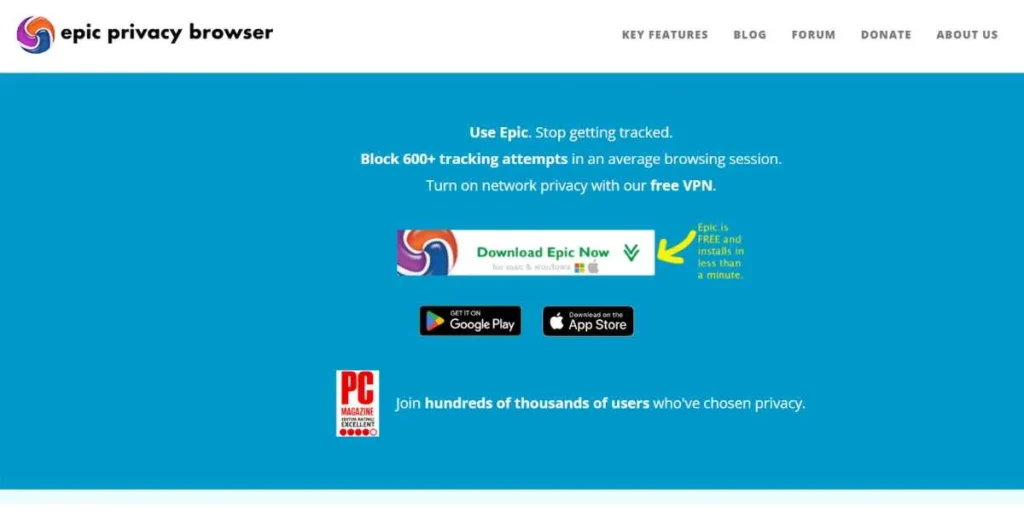
Epic is a browser with an extremely strong focus on privacy. It is anchored on the concept of leave no trace. Once you close the browser, it deletes all your history, cookies, and data. It blocks ads, trackers, and even fingerprinting (a method by which sites recognize you by your computer). Epic has an in-built proxy that is free, making it one of the browsers with free VPN options.
It can be turned on with a single click. This proxy conceals your IP address and redirects your traffic via one of Epic’s servers. While it is not a full VPN, it serves as a very effective privacy proxy.
Strengths:
- Extreme privacy. It blocks all of it by default.
- Erase all your information upon closing it.
- The inbuilt proxy is free and user friendly.
Limitations:
- It is a proxy, not a true VPN.
- Sometimes the websites that require you to log in are broken by this extreme privacy.
- You are forced to re- log in to all your sites each time you open the browser.
Best For:
- Individuals who wish to carry out a quick and discreet search and do not want to leave a footprint on their computer.
7. Opera GX
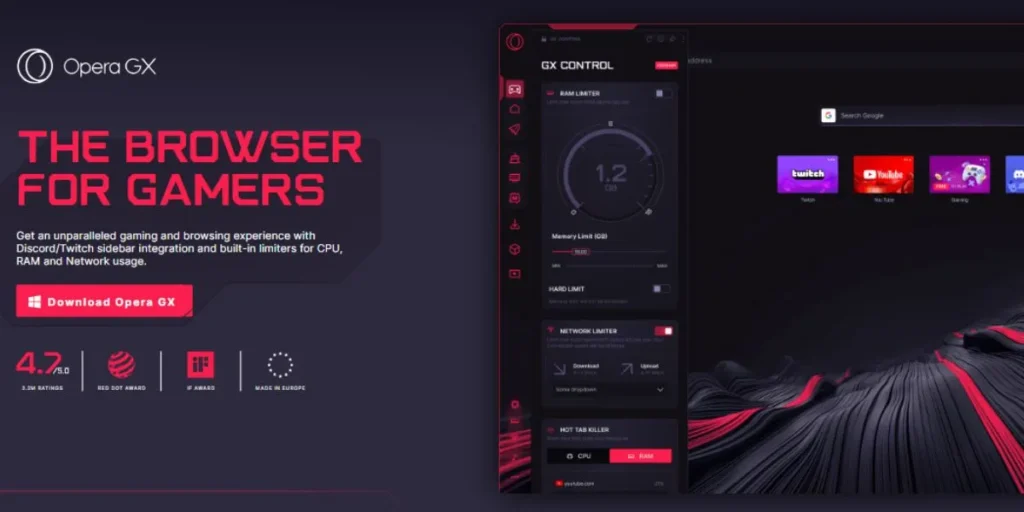
It is another Opera‑based browser, though this one is created specifically to suit gamers. As one of the browsers with built-in VPN, it is dark and stylish with some very peculiar features. It has built‑in restrictions that allow you to limit the amount of CPU and RAM that the browser can consume, so your games run fast without being slowed down by the browser.
It also shares the same free inbuilt VPN (proxy) that is found in the main Opera browser. You can have unlimited data, and it is excellent for bypassing school Wi‑Fi blocks or accessing game servers in restricted regions.
Strengths:
- Same advantages as Opera: data proxy is free and unlimited.
- Unique and fantastic features to gamers (RAM and CPU limiters).
- Appeals cool and it is entertaining to use.
Limitations:
- It is, like a normal Opera, a proxy, not a VPN.
- It probably also gathers advertising user data.
Best For:
- Gamers. It is a browser that you should use in case you are a gamer.
8. Puffin Web Browser
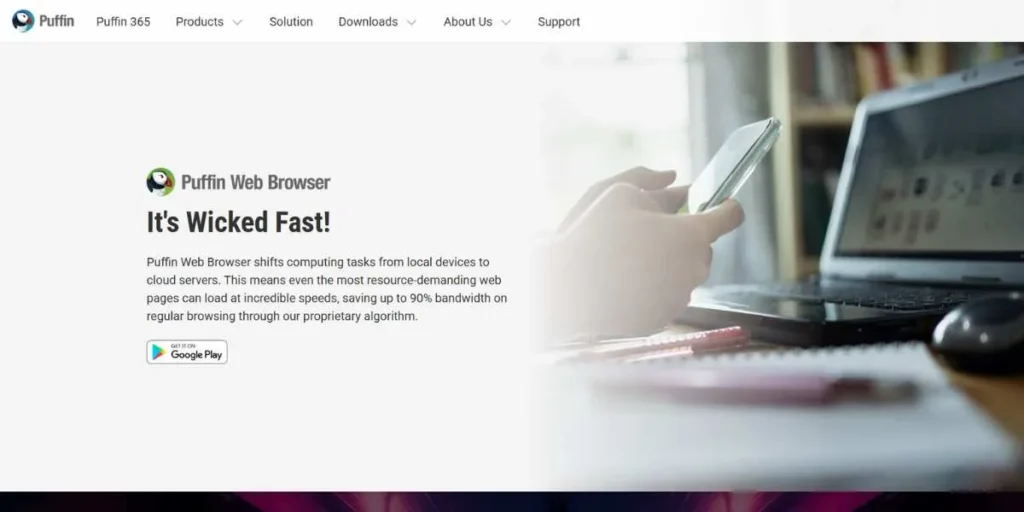
Puffin is a different sort of browser. When you are using Puffin, you are not literally running the site to your computer or phone. Rather, the site is hosted on the strong and safe cloud servers of Puffin. Puffin then streams the site to you, more like a video. This implies that your device is completely detached with any virus or tracker. Since the browsing is done in a cloud server, your actual IP address is not visible at all. This renders it behave like a VPN. It is also extremely quick even using old and slow computers since it is the cloud servers that are doing all the heavy lifting.
Strengths:
- Amazing security. Your machine does not touch the web site.
- Very, very fast.
- Covers up your IP address in the same way that VPN does.
Limitations:
- The mobile free version is limited on data and contains advertisements.
- The difference is that it is somewhat uncomfortable to use, as you are playing with a remote-controlled browser.
- The desktop version is a subscription that is paid.
Best For:
- Individuals who connect to the internet through communal Wi-Fi (such as in a cafe) or have slow and outdated gadgets.
9. AVG Secure Browser
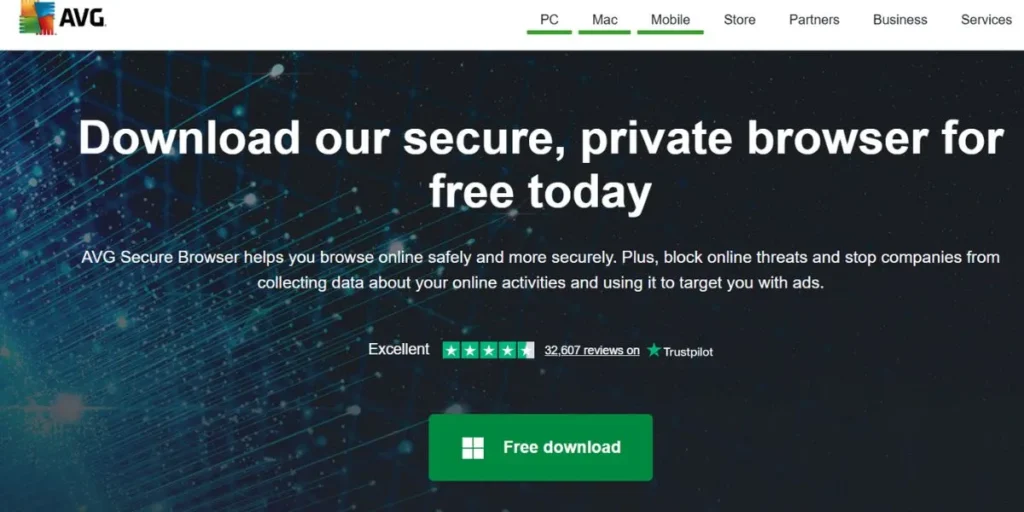
In case this browser sounds familiar, it must have. Another giant antivirus company is AVG, which is owned by the same parent company as Avast. Among the browsers with built-in VPN, AVG Secure Browser is nearly identical to Avast Secure Browser. It shares the same Security and Privacy Center, ad blocker, and anti-phishing features.
It also has an inbuilt connection with AVG SecureLine VPN. Similar to Avast, the free version of the VPN is highly restricted, with the main goal of encouraging users to upgrade to the paid version.
Strengths:
- Well-furnished security features.
- Made under a reputable, known brand.
- Includes a true VPN.
Limitations:
- The VPN is not free. You have to spend on the whole service.
- The company has also been accused of gathering user data just as Avast has.
- They are found to store their entire VPN service as having connection logs (a record of when you connect).
Best For:
- AVG antivirus products already have users and customers.
10. UC Browser
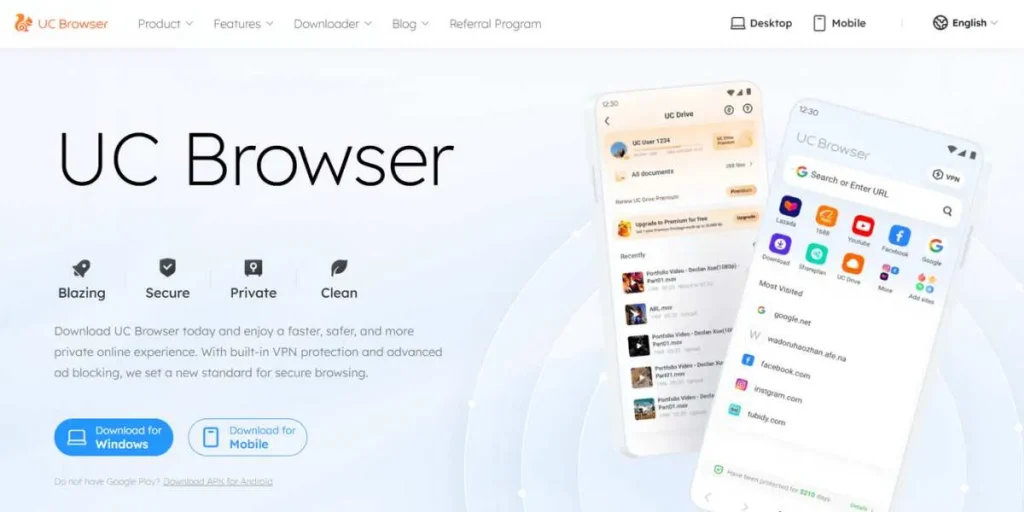
We are putting this browser as a caution. UC Browser is a highly downloaded mobile browser in the world, having more than 1 billion downloads. It is quite popular in countries such as India, China, and Indonesia. It boasts a private mode and is one of the browsers with free VPN. However, it has significant privacy and security issues.
Google Play Store, as well as security researchers, have identified massive vulnerabilities. The application itself requests that it gathers your individual data and web browsing history. And, worst still, it has been reported that its private mode does not necessarily encrypt your data.
Strengths:
- It is quick and it has so-called data compression that saves you money on your cell phone plan. (This is why it is popular).
Limitations:
- Terrible for privacy. It gathers your personal information.
- Terrible for security. Data can even not be encrypted.
- According to users, it is full of spam ads and notifications.
Best For:
- No one. This browser is not what we will suggest to you when you are concerned about your privacy. It is an ideal case of a popular free product that is not safe to use.
Free vs. Paid Built-in VPN Browsers.
There should be no free VPN that you should trust. VPN service is very expensive to run. They require high-speed servers across the globe. None of the companies do it out of generosity.
Free VPNs (such as Opera, Epic, Aloha -Free):
The Catch: You are trading with your information. They frequently (1) track your actions in order to sell to advertisers, (2) present advertisements to you, or (3) provide you with a slow proxy service to get you to upgrade.
- Good For: Simple operations, such as unblocking a YouTube video.
- Bad For: Bad privacy, Internet banking, or evading your government.
Paid VPNs (such as Brave, Aloha-Premium):
- The Advantage: You are not the product, you are the customer. Since they are paid, they will not be inclined to sell your data.
- You Get: The real VPN, higher speed, the increased number of servers (you can choose the country), and the policy of no logs that you can trust.
- Good For: Everybody who cares about his/her privacy on the Internet.
Consider it in the following way: a free VPN is a free public defender. A VPN that requires payment is equivalent to employing a professional attorney.
Device-Specific Considerations
The type of browser can be decided on by the device.
1. On Mobile (iPhone/Android):
Your best choice would be Aloha Browser. It was developed as a mobile one. One can use it with a single hand and the VPN is easy to activate and deactivate.
Puffin also works well in case you have slow mobile internet or other Wi-Fi when you are away.
2. On Desktop (Windows/Mac/Linux):
Brave (when you are ready to spend money on the best privacy) or Opera (when you need a free and easy proxy) are your best options.
- Tor Browser is the final option and the best option of desktop privacy, yet it is too slow to the majority.
For Gamers:
- This is an easy one: Opera GX. It is the first and only browser to be based on gamers with free proxy.
Conclusion
A web browser that has inbuilt VPN is an excellent 2026 tool. It simplifies the online privacy of ordinary citizens. Your choice is simple: To have actual, high-quality, reliable privacy that defends your entire device, then you must decide to use a browser with a paid, true VPN. The most appropriate choice in this case is Brave Browser.
A browser with a free proxy is sufficient in case you simply need a free and easy tool to unblock websites and you are aware that your information may be monitored. The best alternatives here are Opera (desktop) and Aloha (mobile). The greatest lesson learned is this, free on the web is rarely free. You are nearly paying with personal information all the time. Get careful, select the tool that suits your objective and be safe on the internet.
Also Read:- Youtube Vanced Alternatives
FAQs
What browser has the strongest inbuilt VPN?
To have the best true VPN, the best option is Brave Browser, as it is a paid no-logs, system-wide VPN. In the case of the most popular free version (a proxy), the easiest to use is Opera.
Does Google browser contain an inbuilt VPN?
No. Google Chrome is not equipped with an in-built VPN. The Incognito Mode does not conceal your location or safeguard your information, it simply erases your history on your personal computer.
Does it have a browser that is VPN-like?
Yes. Even opera, Aloha, and Epic are like a VPN (although they are only proxies) in that they conceal your IP address and open up websites. Even greater anonymity is ensured by the Tor Browser.
Does it have an inbuilt VPN search engine?
Search engines (such as Google or DuckDuckGo) are web sites where you go to get things. The apps that you use to access those sites are browsers (Google Chrome or Brave).



